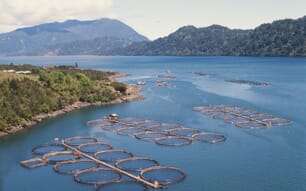Antibiotic use on Chilean salmon farms reached its highest level in nine years in 2015.
The main reason for this high usage was to address Septicemic Rickettsial Syndrome (SRS) challenges, since traditional vaccines and therapies have proved inefficient.
SRS is currently responsible for 78.9 per cent of the disease-induced mortality and use of antibiotics in Chile, according to Sernapesca.
To make drastic reductions to the Chilean salmon industry’s antibiotic use, concrete collaborative measures must be taken.
Therefore, global and local companies operating in Chile, led by Skretting, AquaGen/Blue Genomics, Pharmaq, Centrovet, Cermaq, Blumar and Ventisqueros have launched the groundbreaking Pincoy Project, which aims to address the issue through greater industry joint efforts while also delivering measurable sustainable growth.
It is the primary intention of Pincoy to take a leadership role and progress beyond the culture of talking about antibiotic reduction by delivering tangible, measurable change. This will be achieved through specific actions, involving all stakeholders at all levels of the production chain
Amongst other things, the carefully structured project that started in 2016, comprises selective breeding, high-quality hatchery diets, careful smolt selection, vaccines, functional feed-based diets, best practice protocols at both the freshwater and seawater stages of growth, and close monitoring and reporting throughout.
“Pincoy Project is a very interesting strategy addressing a comprehensive approach that considers preventive aspects of SRS, as well as genetic factors and functional feeds that can strengthen fish health. We also highlight that this project involves a partnership between the public and private sector, which is very important in these kinds of initiatives. In addition, Pincoy is closely aligned with the policies we have been promoting with regards that we, as an industry, have to decrease the use of antimicrobials not only considering disease, but going further and focusing on prevention, control and collaboration between companies as well as science and research, which is very important for us,” said Alicia Gallardo, Deputy Director of Aquaculture at Sernapesca.
"Pharmaq is very familiar with the health problems currently facing the Chilean salmon industry, including SRS. This particular challenge has led to the very high use of therapeutic treatments and a deterioration of fish quality at harvest, not to mention significant farm losses. Following several years’ development, we have established cutting-edge vaccine technology to combat SRS, which is aligned with the objective of generating increasingly sustainable production for the salmon industry. We are confident this will become a valuable tool in Pincoy – a project that is based on the collaborative efforts between companies and institutions in the industry, who are all willing to contribute from their different areas of expertise in order to generate best practices aimed at finding solutions in a sustainable manner,” said Bernd Wrege, Managing Director Pharmaq Chile.




